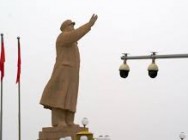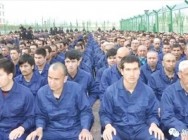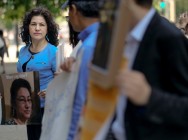Last Minute

- Conflict and Alliance: The US and China: A Centennial Dance: A Century of Relationship from 1900 to 2024
- CHINA RELATIONSEAST TURKESTAN PROBLEM AND TURKEY
- FRONTLINE China Undercover
- Elimination of “Uyghur Counter-Revolutionary Officials” in Academic Fields—Exact Quotes Translated from a Mandarin Audio File
- In Push for Trade Deal, Trump Administration Shelves Sanctions Over China’s Crackdown on Uighurs
- Dalai Lama’s 60th Anniversary Symposium: İlshat Hassan speech in English and Chinese
- Uyghur Detainees from Xinjiang ‘Placed in Nearly Every Prison’ in Shandong Province
- Shahrezad Ghayrat, Unrepresented Women
- Uighur Americans Speak Against China’s Internment Camps. Their Relatives Disappear.
- Rozinisa: The true story of the Uyghur girls in the prison

-

Conflict and Alliance: The US and China: A Centennial Dance: A Century of Relationship from 1900 to 2024
-

CHINA RELATIONSEAST TURKESTAN PROBLEM AND TURKEY
-

FRONTLINE China Undercover
-

Elimination of “Uyghur Counter-Revolutionary Officials” in Academic Fields—Exact Quotes Translated from a Mandarin Audio File
-

In Push for Trade Deal, Trump Administration Shelves Sanctions Over China’s Crackdown on Uighurs
-

Dalai Lama’s 60th Anniversary Symposium: İlshat Hassan speech in English and Chinese
Uyghurs Forced From Refinery Towns Are Left Without Mosques
Thousands of Uyghur oil workers taken from outlying districts into Xinjiang’s Karamay city to enlarge the area’s urban population have been left without places of worship after Chinese authorities failed to make good on promises to build mosques near their new homes, sources said.
Large numbers of Han Chinese and other immigrant workers have now taken over their former homes in towns surrounding the oil refineries—some as far away as 60 kilometers (approximately 37 miles) outside of Karamay—though some Uyghurs relocated by authorities into the city still commute to their old jobs, sources said.
Local authorities began to move residents from the refinery sites in 2005, with the work of relocation into the prefecture-level city in northern Xinjiang still ongoing, sources said.
Further details regarding policy directives behind the move were not immediately available.
“It has been six years since we were moved to our new locations in the city, and we still have no place to pray,” Abduqeyim Qarihajim, the former imam, or religious leader, of the No. 3 Petroleum Plant located outside Karamay, told RFA’s Uyghur Service.
More than 10,000 people are now set to move into new apartments in Karamay city, Qarihajim said, with at least 2,000 of these classed by Chinese authorities as “minorities.”
“[But] we have no mosques, and we cannot pray in other places for fear of being branded as illegal religious activists, so we are praying in our homes,” he said.
Applications have already been made, and funds raised, to build new centers for prayer, he said. “But so far, we have not had any answer.”
“This is creating a lot of problems for people—especially when it comes to performing rituals like funerals,” he said.
Shrinking numbers
Prayers at the No. 3 Petroleum Plant mosque outside Karamay would in earlier years have drawn large numbers of worshippers, a senior manager of No. 3 Plant named Hosanjan told RFA.
“But right now, we have from 60 to 70 people who come to pray five times a day,” he said.
“For Friday prayers, we have from 150 to 200 people,” he added.
“Most of the people of No. 3 Plant have been moved to the city, but no mosques have been built for them yet,” Hosanjan said.
Workers from many other locations have now also been moved to Karamay city to enlarge the city’s population, with lower-level plant officials promising that mosques would be built for them near their new homes, Hosanjan said.
“But no written agreements were ever made,” he said.
“I am a government official, but I also represent the people,” Hosanjan said. “And though the people have tried their best to get permission to build mosques, this problem has still not been resolved.”
The Xinjiang region, which is home to millions of Turkic-speaking Uyghurs, has seen an upsurge in violence that has left hundreds dead since 2012, and which China has blamed on terrorists and Islamist insurgents seeking to establish an independent state.
But rights groups accuse the Chinese authorities of heavy-handed rule in Xinjiang, including violent police raids on Uyghur households, restrictions on Islamic practices, and curbs on the culture and language of the Uyghur people.
Reported by Ehsan for RFA’s Uyghur Service. Translated by Mamatjan Juma. Written in English by Richard Finney.
http://www.rfa.org/english/news/uyghur/mosques-11102014162101.html
RELATED NEWS












